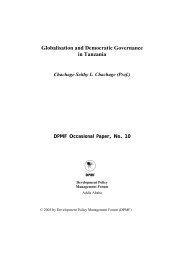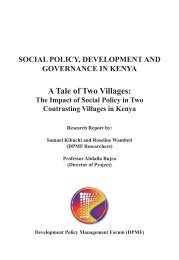From the Lagos Plan of Action (LPA) - DPMF.org
From the Lagos Plan of Action (LPA) - DPMF.org
From the Lagos Plan of Action (LPA) - DPMF.org
You also want an ePaper? Increase the reach of your titles
YUMPU automatically turns print PDFs into web optimized ePapers that Google loves.
22 <strong>DPMF</strong> Occasional Paper No. 13set <strong>the</strong> prices for all commodities produced by African economies. Theyfur<strong>the</strong>r controlled <strong>the</strong> financial system and set interest rates and o<strong>the</strong>rconditions for African borrowing. Finally, <strong>the</strong> west controlled services e.g.insurance companies, and at <strong>the</strong> same time, provided <strong>the</strong> expertise andpersonnel to help African countries with highly underdeveloped humanresources.Needless to say, <strong>the</strong>y advised African governments not to disturb thisestablished economic structure and to continue with <strong>the</strong> inheritedrelationship with <strong>the</strong> international economic system. After all, this was <strong>the</strong>“natural” division <strong>of</strong> labour in <strong>the</strong> world and any attempt by Africangovernments to change <strong>the</strong>ir economic strategies and policies to reorient<strong>the</strong> relationship to <strong>the</strong>ir advantage was quickly stopped by variousinstruments Western countries wielded, and still wield.These instruments varied from <strong>the</strong> manipulation <strong>of</strong> <strong>the</strong> financial systemand <strong>of</strong> commodity prices against African countries to withdrawal <strong>of</strong>technical assistance and investment, and occasionally, direct sanctionsagainst non-conforming countries. In <strong>the</strong> face <strong>of</strong> this formidable power,most African countries continued to pursue economic policies anddevelopment in <strong>the</strong> way established by colonial powers. As noted earlier,by <strong>the</strong> end <strong>of</strong> <strong>the</strong> 1960s, <strong>the</strong> rapid economic growth initially observed inAfrican countries began to slow down and foreign currency reservesstarted to be exhausted.As <strong>the</strong> Cold War intensified and <strong>the</strong> ideological war <strong>of</strong> converting Africancountries heated up in <strong>the</strong> 1970s, externals increased in number beyond<strong>the</strong> number <strong>of</strong> former colonial powers. Externals came to include <strong>the</strong>Americans (representing <strong>the</strong> West), <strong>the</strong> Soviet Union (representing <strong>the</strong>Communist East), Scandinavian countries (representing European socialdemocracy) and China (representing Third World Communism). All <strong>the</strong>sepowers played <strong>the</strong>ir parts in trying to influence political and economicdevelopment <strong>of</strong> African countries. And <strong>the</strong> story <strong>of</strong> <strong>the</strong> internal struggleamongst externals for control <strong>of</strong> African countries, though important, isknown only superficially.What is <strong>of</strong> interest here is that this serious political and military strugglefor African countries was accompanied by a heated ideological debateover alternative paths to development. The debate was not just confined toCapitalism and Marxism, but included several new ideas on possibilities<strong>of</strong> development in Third World countries. These different developmentpaths included those advocated by <strong>the</strong> Dependency School <strong>of</strong> Latin




